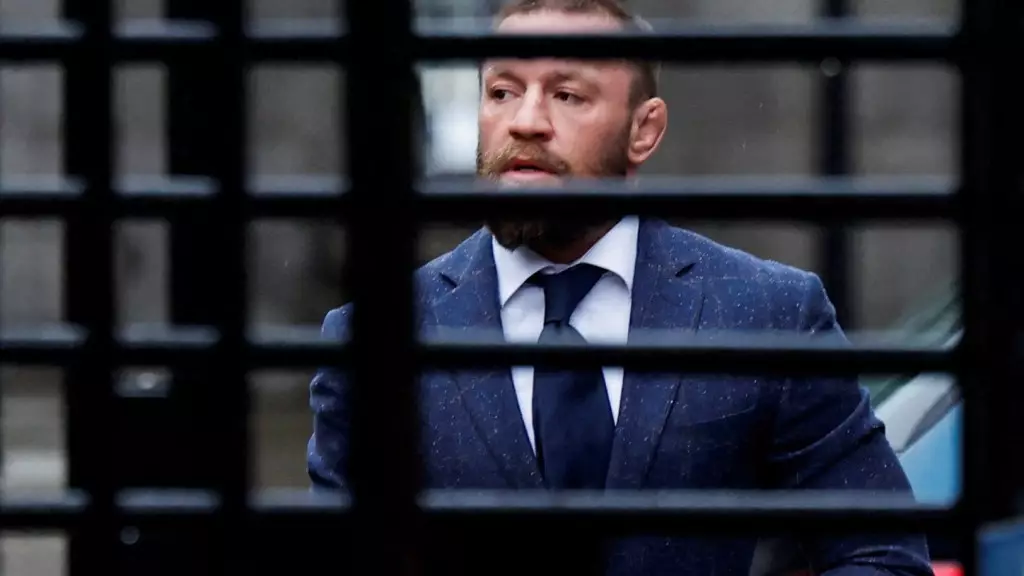Conor McGregor, the name synonymous with mixed martial arts (MMA), has not fought in the Ultimate Fighting Championship (UFC) for over three years. Once the promotion’s biggest star, his diminishing presence raises questions about his future in the sport and what it means for both him and the UFC. As the dust settles from recent legal challenges, Conor’s trajectory within the sport appears clouded by personal turmoil, public scrutiny, and an apparent struggle with his legacy.
McGregor’s latest bout has unfolded outside the ring, culminating in a civil trial concerning serious allegations of sexual assault involving a woman named Nikita Hand. This case, which lasted nearly two weeks, concluded with a jury finding McGregor liable for assault, marking a severe blow to his reputation. Following the trial, prominent UFC commentator Joe Rogan expressed his misgivings about McGregor’s ability to return to fighting, indicating that the stress from the trial might have devastated McGregor’s mind and body.
In light of these allegations, McGregor’s legal troubles reflect the complexities of fame and success intertwined with public accountability. Rogan’s remarks reveal an intricate narrative: McGregor, once celebrated for his tenacity and bravado, now lives under a shadow of doubt and speculation. The implications of the trial can weigh heavily on an athlete, particularly as fans and sponsors reassess their support amidst scandal.
Rogan pointed out a gritty reality facing many fighters, including McGregor, that the physical toll of relentless competition can lead to significant mental health struggles. He suggests an ongoing battle with trauma not only from in-cage battles but also exacerbated by lifestyle choices that often accompany fame—namely, substance abuse and self-medication. McGregor’s heavy partying habits, openly discussed during the trial, spotlight underlying issues that frequently accompany high-profile athletes.
Moreover, the brutal nature of mixed martial arts demands a constant state of readiness and resilience, which can be detrimental in the long run. Fighters like McGregor, who have faced considerable damage over lengthy careers, struggle with vulnerability. Rogan’s speculations regarding the influence of traumatic brain injuries bring to light an essential conversation about athlete welfare and the accountability of sports organizations in looking after their fighters.
After training vigorously for a comeback fight against Michael Chandler at UFC 303, McGregor faced yet another setback when he suffered a broken pinky toe during training. This injury constrained him from making his anticipated return earlier this year, deepening the uncertainty surrounding when—or if—he will step back into the octagon. UFC CEO Dana White’s comments suggest that any potential return to professional fighting may not be on the horizon until late 2025.
Interestingly, this period of seclusion has sparked discussion regarding a possible exhibition match with social media sensation Logan Paul. McGregor’s vague tweet indicating an agreement for this matchup raises eyebrows, particularly when considering the financial implications and McGregor’s previous disdain for exhibition bouts. The proposed fight demonstrates a departure from the conventional fight structure, potentially representing a strategy for McGregor to reclaim some prominence even as he grapples with the circumstances that led to his hiatus from the sport.
The Legacy Beyond Fighting: What Lies Ahead?
As McGregor steps back from the spotlight, questions of legacy and personal redemption come to the forefront. While he was once a paradigm of athletic achievement, the recent legal issues and lifestyle struggles complicate the narrative of what his legacy will ultimately embody.
McGregor’s fanbase, which once idolized him for confidence and unmatched skill, may now grapple with a more nuanced and, perhaps, somber understanding of their favorite fighter. His path ahead seems to oscillate between redemption and further adversity—each decision has the potential to alter not only his future in the cage but also the way he is perceived by fans, sponsors, and the larger sports community.
Conor McGregor’s future in the UFC seems precarious at best. Legal woes, personal struggles, and an uncertain return to competition weave a complicated tale for a man on the edge of notoriety and obscurity. How he navigates these challenges will ultimately dictate his legacy—one that could be a testament to resilience or a reminder of a fallen star.

